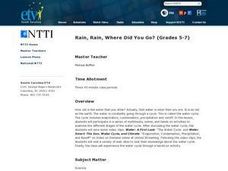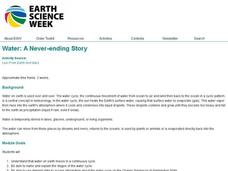Curated OER
The Water Cycle (Evaporation, Condensation, Precipitation)
The 3 steps of the water cycle, evaporation, condensation, and precipitation, are the focus of this lesson plan. After a neat demonstration of rain using hot water, a pie tin, and ice cubes, young scientists observe and discuss the...
American Chemical Society
Condensation
It's time to break the ice! If you are doing all of the lessons in the unit, children have already seen that increasing heat increases the rate of evaporation, but is the opposite true? Does decreasing temperature cause more condensation...
Curated OER
The Water Cycle
Fifth graders explore the major components of the water cycle. They pay close attention to evaporation, condensation, and precipitation. A water cycle kit is set up in the classroom, which learners observe for a couple of days before the...
Baylor College
What Is the Water Cycle?
Small groups place sand and ice in a covered box, place the box in the sunlight, then observe as evaporation, condensation, and precipitation occur. These models serve as miniature water cycles and demonstrations of the three phases of...
Curated OER
The Properties of Water: "Dead Or Alive"
Students study the water cycle and create a booklet entitled: "Discover the Wonder of Water" They observe and record data regarding evaporation, condensation, and precipitation and how water moves from a solid to a liquid to a gas. They...
Curated OER
Understanding the Water Cycle
Investigate the water cycle and how water moves from the land to the air and back to the land. Create a terrarium and observe the water cycle at work. Define weather terms including evaporation, condensation, and precipitation.
Curated OER
Follow the Water Cycle
Pupils explore the stages in the water cycle, evaporation, condensation, and precipitation. They hypothesize about the source of rain and search for forms of water on Earth.
Curated OER
"Lettuce" Learn About the Water Cycle
Young scientists investigate the water cycle through a lettuce seed experiment. For this experiment, learners plant lettuce seeds inside of a ziplock bag in order to create a small greenhouse. They observe condensation and precipitation,...
Curated OER
Condensation
Students participate in the scientific process to investigate what happens to water when it evaporates by observing condensation. In small groups they observe what happens to ice in a cup, and what occurs when they hold a bowl of ice...
Curated OER
The Water Cycle
Observe the stages of the water cycle by completing 3 activities. To help understanding of the water cycle your students can observe evaporation, the formation of frost, vapor and water and the process of distillation which is used to...
Curated OER
Evaporation
Fourth graders study the water cycle and the different processes involved, specifically evaporation. They explore the processes of evaporation through hands-on collaborative activities and relate learning to life through...
Curated OER
Evaporation
First graders explore, analyze, document and study weather and the water cycle. They observe the weather and begin a weather journal. Each student interacts with the concepts of evaporation, condensation and precipitation, clouds,...
Curated OER
It's Clean, Fresh and only Three Billion Years Old - Water!
Students engage in a lesson which explores the wate cycle. They get to see some very entertaining video, do fun hands-on activities and gain a better understanding of evaporation, condensation, precipitation and collection.
Curated OER
The Water Cycle
Fifth graders investigate evaporation, condensation, and precipitation. They observe a water cycle kit and record their observations, and examine how water condenses on the outside of a cup. Next, they observe an evaporation...
Curated OER
Water Cycle Bag
Students enclose water in an airtight bag and leave it in a warm area to view the water cycle. In this water cycle lesson plan, students observe evaporation, condensation, and precipitation. They then discuss what they learned about the...
Curated OER
Temperature Change and the States of Matter
Tenth graders observe the processes of evaporation, condensation, melting, freezing, boiling, and sublimation. They do a quantitative investigation of the freezing of water, to explore explanations that involve particles.
Curated OER
Meteorology (Condensation)
Second graders define condensation and evaporation. They identify and describe the steps in the water cycle. They ask questions to end the lesson.
Curated OER
Condensation and the Water Cycle
Students explore the natural distallation process that occurs in the water cycle. They use plastic cups and cotton swabs to observe the condensation process that is evident in the water cycle.
UNESCO
The Water Cycle
Young scientists get their feet wet as they learn about the water cycle in this series of activities. Whether they are observing how evaporation causes puddles to dry up, or how plants put water into the atmosphere through...
Curated OER
Water Changes and Moves
Students explore the three forms of water and observe how it changes from a solid to a liquid to a gas. The concepts of condensation, evaporation and the introduction to the water cycle form the basis of this instructional activity.
Curated OER
Water Cycle Lesson Plan
After conducting experiments with a sponge, ice water, and a soda bottle your young scientists become familiar with the water cycle through experiment, song, hand motions and drawing. Students sing about the water cycle and discuss...
Curated OER
Moist Air & Clouds
Fifth graders study the weather and water cycle of clouds. In this water cycle lesson, 5th graders read background information about evaporation, condensation, and the states of water.
Curated OER
Rain, Rain, Where Did You Go?
Students study the water cycle including condensation, evaporation, and precipitation. In this water cycle lesson, students watch a video and access assigned web sites to investigate the water cycle. They complete an experiment with a...
Curated OER
Water: A Neverending Story
Students investigate the water cycle. In this water cycle science lesson, students participate in a series of activities that demonstrate evaporation, precipitation, and condensation. Students describe their observations using...























